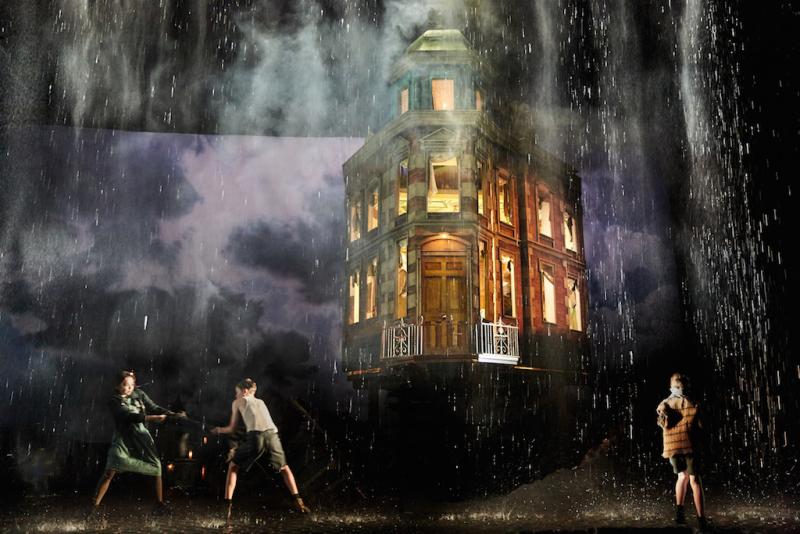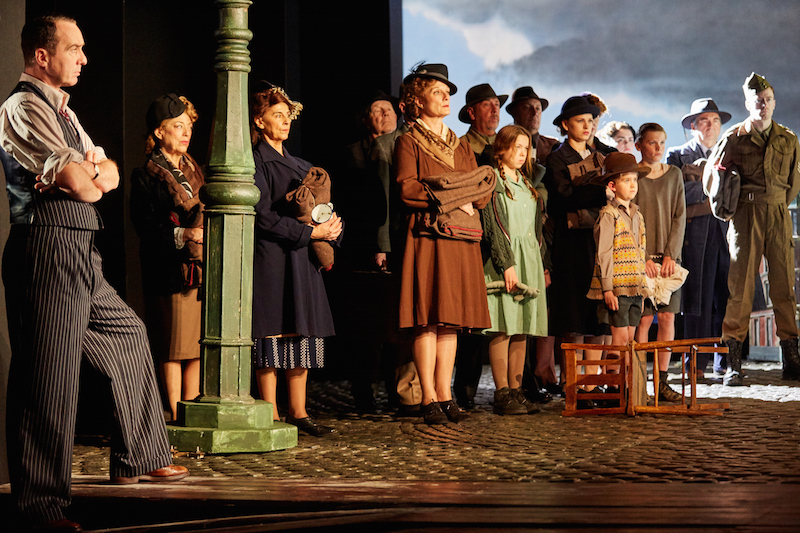An Inspector Calls, Playhouse Theatre | reviews, news & interviews
An Inspector Calls, Playhouse Theatre
An Inspector Calls, Playhouse Theatre
Stephen Daldry's makeover of the JB Priestley classic is back, and misses its mark

So, the Inspector has come calling yet again. Twenty-four years have passed since Stephen Daldry’s graphic revision of JB Priestley’s moral tub-thumper opened at the National, followed by a tour of duty in the West End that seemed to go on forever. The Birling family house collapsed eight times a week at the Aldwych, the Garrick, the Novello and then Wyndhams, and set builders never had it so good.
Yet it would be wrong to assume that nothing about this production has changed in that time. For a start, its success has more or less finished off any possibility of staging this period drawing-room drama in a traditional way. More crucially, though, its field of reference has shifted. In 1992, when Daldry and his designer Ian MacNeil conceived their triple-layer time-shift reading, the “now” was a Thatcherite Britain awash with new money. This revival, with a fresh cast, plays in a Britain more riven, more fearful, more uncaring, than at any time since the play was written.
Without this production Priestley's play would by now be languishing in outer am-dramshire
The well-to-do Birling family are toasting the daughter’s engagement when an unexpected knock at the door shakes their self-satisfied world to its core. A young woman has been found dead after drinking bleach, and the visiting Inspector Goole (the clue’s in the name) wants to question each family member in turn. All deny knowledge of the girl, but gradually it transpires that each, unwittingly, has played a part in her demise.
Daldry’s big idea was to position these comfortable Edwardians and their home within the devastated urban landscape of the Blitz, 30 years later. It was social inequality, Priestley believed, along with capitalism’s gross disregard for working people, that had led to both world wars. Daldry additionally has the Inspector break the fourth wall to address the audience in the here and now. The message is clear: there is such a thing as society, and we all bear responsibility for one another.
Under the Victorian proscenium of the Playhouse, MacNeil’s realisation of the Birlings' house – a corner-plot gothic pile teetering on stilts – still makes a terrific impact when the curtain goes up. Around it lies the smoking wreckage of a rain-lashed English street after a visit from the Luftwaffe, behatted residents slowly emerging to gawp at the destruction. Within this anachronism, the 1912 family celebration half-audibly going on within its first-floor dining room registers a brittle disconnect. It’s a smart way on the director’s part of dealing with a less-than-fascinating bit of exposition.
Even smarter is the way the set physically impinges on the characters once the room’s hinged front wall – in the manner of a doll's house – has swung open to expose its residents. When daughter Sheila (Carmela Corbett), walks to the perimeter of the dining room, she has to take extreme care not to topple off the edge. When the industrialist Arthur Birling goes downstairs to meet the Inspector, he is obliged to insert a cast-iron baluster (a product of his own factory perhaps) to make the descent possible.
The production is full of such neat details, along with others that miss the mark. Midway through (there is no interval) Stephen Warbeck’s pre-recorded score – dominated by doomy cello – swerves into a direct quotation from Bernard Herrmann’s music for the film Vertigo, and you notice that the roundel of the Birlings' house has been lit (by Rick Fisher) to resemble the tower of the famous Spanish church in the climax of that film, from which the heroine hurls herself to her death. I’m still puzzling over that, as well as the curious moment when the Inspector (a testy Liam Brennan, pictured below, far left) peers up to the lighting box and calls proceedings to a temporary halt, as if he’s a film director calling “cut!”. Neither allusion is followed up.
 While it’s probably true that without this production JB Priestley’s play would by now be languishing in outer am-dramshire, it’s questionable whether it fully responds to Daldry’s treatment. It remains a clunky old formula, and we see the dénouement coming a long way off: it's hardly a "thriller" as advertised. Worse, the play’s moral reprimand now feels dated in its outspokenness. Ken Loach’s latest film, I, Daniel Blake, is didactic on a similar subject, but more oblique and infinitely more potent.
While it’s probably true that without this production JB Priestley’s play would by now be languishing in outer am-dramshire, it’s questionable whether it fully responds to Daldry’s treatment. It remains a clunky old formula, and we see the dénouement coming a long way off: it's hardly a "thriller" as advertised. Worse, the play’s moral reprimand now feels dated in its outspokenness. Ken Loach’s latest film, I, Daniel Blake, is didactic on a similar subject, but more oblique and infinitely more potent.
The cast cannot be faulted – we believe in every one of these people, at least as individual types. Whether they hang together as a plausible Edwardian family is debatable. Clive Francis is a standout as the smug northern ex-mayor who had hopes for a knighthood and Barbara Marten is magnificently imperious as his wife, but her Knightsbridge vowels do not belong in the same room. For all its noisy spectacle (the smashing glassware from the sliding dining table is quite something), Daldry’s An Inspector Calls neither moves us to pity nor leaves us with the resolve to behave better, which is surely what Priestley intended.
- An Inspector Calls is at The Playhouse Theatre to 4 February
- Read more theatre reviews on theartsdesk
STEPHEN DALDRY'S FINEST MOMENTS
Skylight. David Hare's domestic epic dazzles anew with Carey Mulligan and Bill Nighy
The Audience. Helen Mirren returns in triumph as Her Majesty
The Crown. So was it worth £100m? (Yes)
The London 2012 Opening Ceremony. Danny Boyle and Stephen Daldry dazzle
Trash. Three unknowns save the day
PLUS ONE TURKEY
Extremely Loud and Incredibly Close. Adaptation of Jonathan Safran Foer's novel is lacking in magic
The future of Arts Journalism
You can stop theartsdesk.com closing!
We urgently need financing to survive. Our fundraising drive has thus far raised £49,000 but we need to reach £100,000 or we will be forced to close. Please contribute here: https://gofund.me/c3f6033d
And if you can forward this information to anyone who might assist, we’d be grateful.

Subscribe to theartsdesk.com
Thank you for continuing to read our work on theartsdesk.com. For unlimited access to every article in its entirety, including our archive of more than 15,000 pieces, we're asking for £5 per month or £40 per year. We feel it's a very good deal, and hope you do too.
To take a subscription now simply click here.
And if you're looking for that extra gift for a friend or family member, why not treat them to a theartsdesk.com gift subscription?
more Theatre
 Ragdoll, Jermyn Street Theatre review - compelling and emotionally truthful
Katherine Moar returns with a Patty Hearst-inspired follow up to her debut hit 'Farm Hall'
Ragdoll, Jermyn Street Theatre review - compelling and emotionally truthful
Katherine Moar returns with a Patty Hearst-inspired follow up to her debut hit 'Farm Hall'
 Troilus and Cressida, Globe Theatre review - a 'problem play' with added problems
Raucous and carnivalesque, but also ugly and incomprehensible
Troilus and Cressida, Globe Theatre review - a 'problem play' with added problems
Raucous and carnivalesque, but also ugly and incomprehensible
 Clarkston, Trafalgar Theatre review - two lads on a road to nowhere
Netflix star, Joe Locke, is the selling point of a production that needs one
Clarkston, Trafalgar Theatre review - two lads on a road to nowhere
Netflix star, Joe Locke, is the selling point of a production that needs one
 Ghost Stories, Peacock Theatre review - spirited staging but short on scares
Impressive spectacle saves an ageing show in an unsuitable venue
Ghost Stories, Peacock Theatre review - spirited staging but short on scares
Impressive spectacle saves an ageing show in an unsuitable venue
 Hamlet, National Theatre review - turning tragedy to comedy is no joke
Hiran Abeyeskera’s childlike prince falls flat in a mixed production
Hamlet, National Theatre review - turning tragedy to comedy is no joke
Hiran Abeyeskera’s childlike prince falls flat in a mixed production
 Rohtko, Barbican review - postmodern meditation on fake and authentic art is less than the sum of its parts
Łukasz Twarkowski's production dazzles without illuminating
Rohtko, Barbican review - postmodern meditation on fake and authentic art is less than the sum of its parts
Łukasz Twarkowski's production dazzles without illuminating
 Lee, Park Theatre review - Lee Krasner looks back on her life as an artist
Informative and interesting, the play's format limits its potential
Lee, Park Theatre review - Lee Krasner looks back on her life as an artist
Informative and interesting, the play's format limits its potential
 Measure for Measure, RSC, Stratford review - 'problem play' has no problem with relevance
Shakespeare, in this adaptation, is at his most perceptive
Measure for Measure, RSC, Stratford review - 'problem play' has no problem with relevance
Shakespeare, in this adaptation, is at his most perceptive
 The Importance of Being Earnest, Noël Coward Theatre review - dazzling and delightful queer fest
West End transfer of National Theatre hit stars Stephen Fry and Olly Alexander
The Importance of Being Earnest, Noël Coward Theatre review - dazzling and delightful queer fest
West End transfer of National Theatre hit stars Stephen Fry and Olly Alexander
 Get Down Tonight, Charing Cross Theatre review - glitz and hits from the 70s
If you love the songs of KC and the Sunshine Band, Please Do Go!
Get Down Tonight, Charing Cross Theatre review - glitz and hits from the 70s
If you love the songs of KC and the Sunshine Band, Please Do Go!
 Punch, Apollo Theatre review - powerful play about the strength of redemption
James Graham's play transfixes the audience at every stage
Punch, Apollo Theatre review - powerful play about the strength of redemption
James Graham's play transfixes the audience at every stage
 The Billionaire Inside Your Head, Hampstead Theatre review - a map of a man with OCD
Will Lord's promising debut burdens a fine cast with too much dialogue
The Billionaire Inside Your Head, Hampstead Theatre review - a map of a man with OCD
Will Lord's promising debut burdens a fine cast with too much dialogue

Add comment